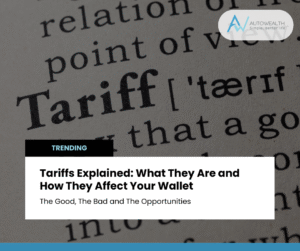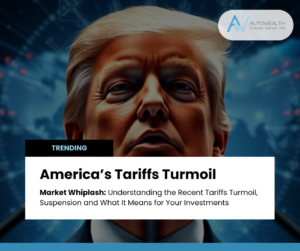In the last 2 months, U.S. has been carefully planning trade tariffs aimed at addressing its major global trade imbalances. On 22 Mar 2018, President Trump finally announced the first salvo covering up to US$60 billion of Chinese imports.

Is market panic warranted? How should clients position their investments? Here’s our analysis.
(1) How are current economic fundamentals?
Labour markets, wage growth, consumer spending and corporate earnings are positive and improving. These fundamental factors provide upside support for financial markets over the long run.
(2) How much of global trade are at stake?
Bloomberg Economics projects a trade war could wipe US$470 billion off the world economy by 2020. U.S. economy stands at an estimated US$19.4 trillion in 2017 and China economy stands at an estimated US$11.9 trillion. The potential impact to global trade is therefore material yet measured.
(3) What is the direct impact on companies/stocks?
Companies/stocks in the sectors subject to trade tariffs, both announced and those in the pipeline, are expected to be more adversely affected. Impact is likely to spillover to other sectors over the short-run due to broad market panic and likely to recover once rationality prevails.
Small-cap stocks, which structurally have lower revenue contribution from overseas markets, should withstand trade tensions better than their larger counterparts. This is why the Dow Jones Industrial Average declined 2.9% whilst the Russell 2000 declined on a lower margin of 2.2% at the first salvo of trade tariffs announced on 22 Mar 2018.
(4) Is it in the interest of policymakers to engage in a trade war?
No, a “trade war” erases wealth for business owners and investors. This can only destroy electoral votes. A carefully-navigated “trade tension” can otherwise reduce unfair trade imbalances and win electoral votes.
President Trump is trying to do the latter and to deliver on one of his key campaign promises. The U.S. tariffs have exempted some ally countries, reflecting its aim targeted at specific trade imbalances. Similarly, China’s retaliation have been measured as the nation stands to lose more than it can potentially gain.
(5) How then should clients position for trade tensions?
From the above analysis, an escalation in trade tensions will likely present multiple opportunities for market corrections. There will certainly be market panic and overreaction to even the slightest exaggeration or panic-inspiring media headlines.
Clients with holding power are likely to be better-off not succumbing to emotional panic or locking in losses at any short-run market corrections.
Our proprietary studies on AutoWealth Balanced Portfolios (60% Stocks 40% Govt Bonds) found that market corrections that results in a temporary 4.0%~5.8% decline in portfolio value occurs 1.75 times on average across the last 16 years and temporary >5.8% decline occurs 1.00 times on average, with the worst correction being a 11.3% decline.
Clients with recurring streams of income/capital, eg from employment or rental income, may consider value averaging into market corrections at thresholds of 4.0% and 5.8%.












